
JULIA LEE BARCLAY-MORTON – YOGA, WATER AND REWRITING AUTISM
I interviewed writer Julia Lee Barclay-Morton about her experience of autism. Julia began as an experimental dramatist in New York, moving to the UK to
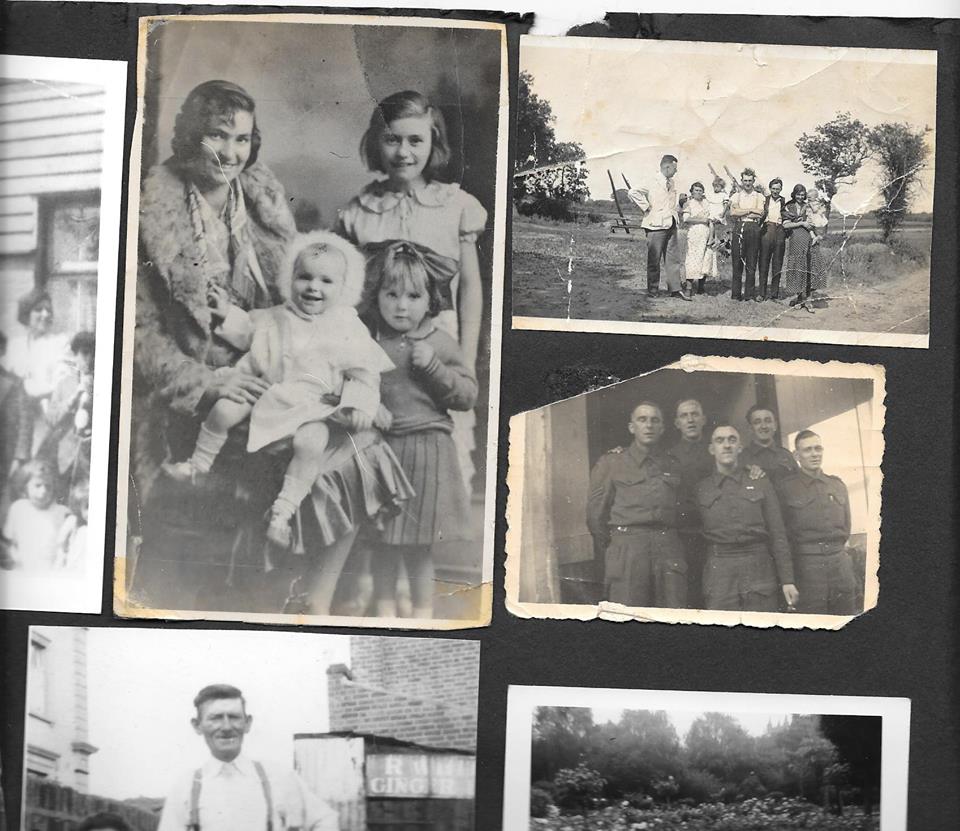
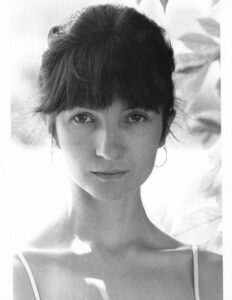
I interviewed Raine Geoghegan about how her writing and stage work have been affected by M.E. and Fibromyalgia. Raine, a former actress, dancer, theatre director and choreographer, worked in the West End and London Fringe. She has now moved into writing prose, poetry and teaching short courses in drama and voice work. Raine has an MA in Creative Writing and has been published in Anima; Poetry & Jazz Magazine; Reflections of the South Downs, Mslexia, and Creating Connections, a disability living magazine. Currently Raine is working on a project with a mentor based on her Romany Heritage. She has had M.E. and Fibromyalgia for twenty years.
Leslie: Bearing in mind your wide range of creative interests and your experience of illness, can you give a brief summary, please, of the journey you’re on as a writer and thinker?
Raine: As I gather all the many threads of my creative life – writing, dancing, acting, directing and teaching – I begin to see that all they have all become instrumental in making my life whole and meaningful. Even living with chronic illness has given me a new perspective on how I function and the way in which I use my personal power. It has taught me how to be still, how to listen to my body and bring balance into everyday life. When I first started to write this post I was ill in bed with bronchitis and a high fever. It reminded me of the time in 1996 when I was first diagnosed with M.E. and of the days that I spent in bed, unable to do even the smallest of tasks. I had been offered an unconditional place on the Masters course in Theatre Practice at Middlesex University. As the days, weeks and months rolled past it became clear that I had to let that plan go, in fact all my work fell by the wayside. I was a single parent to two children trying to cope as best as I could, but even that role was compromised. All I could do was to focus on getting through each day and trying to keep my spirits up.
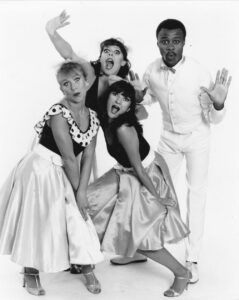
Having been such an active person I couldn’t believe just how much energy it took to take a shower or prepare breakfast: small tasks, but the equivalent of climbing a steep hill. I also found simple things like watching television or talking with someone extremely exhausting. The late John O’ Donohue wrote about chronic illness as a new territory and one that we need to navigate our way through. This was certainly how it felt to me. Thankfully I had always been aware of my spirituality. I followed a simple spiritual practice and this became more important than ever as it felt like I was dying – which in effect I was, dying to the old but not yet knowing what I was birthing. Day after day I would get up, shower and breakfast with the help of my partner then go back to bed. One day I asked myself – what CAN you do? And the answer was – you can breathe, pray, write. I started to keep a journal. The following notes are taken from it.
‘How do we begin to take steps to heal ourselves when we feel at rock bottom?
We breathe.
We look at what we can do, not what we can’t.
We take one small step, then another.
We invest in our future by planting seeds of hope and courage.
We do it our way and we keep it simple.
We hold the intention of becoming whole and well in our hearts.
We stop trying to control everything instead we learn how to trust our mind, body and soul.
(November 1996)
I also wrote a series of meditations and evocations on the Divine Mother. In June 2016 three of these pieces were published in Ground, an online journal that explores faith.
Meditation on the Mother
Sophia
‘Never has there been a time when I could not show myself to you for you are all seeing and your gaze penetrates all things. Your love blazes into every corner and crack
blissfully washing away all pain.’
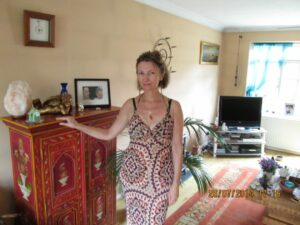
Writing helped me to connect with my creative spirit but it also became part of a healing process.
During the Masters in 2012-20I5 I was able to feed my experiences of chronic illness into my work and wrote specifically about pain and disability for my dissertation. The following through lines are taken from this.
‘White curtains of infinite fatigue/stretch before me/like sail cloth of a boat becalmed/hanging creased and limp. I long for someone to pull them open/to let the light in.’ White Curtains of Infinite Fatigue 2015
Here in The Body Speaks to the Mind I experimented with form and the idea of allowing an exchange between the mind and the body.
‘Remember the signs?/pain – pins pressed against the back of my eyes/pressure in the neck/the brain fizzing as if a foreign entity had collided with it. Remember how my muscles became taut, like string when it is pulled hard?
(Curlymindblog.com – December 2015)
I also explored how concrete and synthetic light affects the M.E. sufferer. There is often an acute sensitivity to light, sounds and smell.
‘Imagine a quiet room … somewhere in Ludgate Shopping Centre. / A place to lie down/where limbs, bones rest inside their skin. / She considers going into the store. / Images of glass doors swinging, bright lights, babies crying and musak, / forcing itself into ears, eyes, head. A deep thirst and a yearning / for soft earth, grass, / the healing tones of green.’ Ludgate Shopping Centre, 2014.
Illness opened a door. It provided me with quiet, solitude and the space to focus on writing poetry, to go deeper into what it was that I needed to express.
‘Poetry begins in solitude.’ John Agard, poet.
Writing, particularly poetry, feeds and sustains me. I love the process of coming across a seed of an idea, crafting it, then reworking the whole.
I’ve put my plan for a pamphlet on hold. Writing about chronic illness has been a huge challenge. I hope to return to it at some point but for now I am concentrating on a project based on my Romany Roots. I have acquired so much material that at times it feels like a lifetime’s work. I am noticing that the energy around this work is empowering and strengthening. When I read monologues written for my Granny, I sense the strong dynamic in the dialogue. She was a very strong Romany woman and it’s important that I do her and the other family members justice.
Leslie: What set you off exploring your Romany roots? Can you give specific anecdotes and linguistic examples showing what you’ve learned?
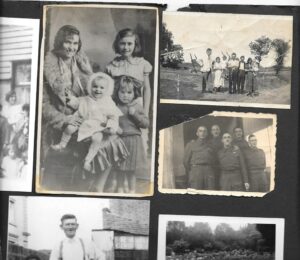
Raine: I have been working with a mentor and it was he who suggested that I write about my Romany roots. We talked about the power of writing something that felt authentic and truthful. I was born in South Wales; my father was Welsh, my grandparents Irish/Welsh and my great grandparents Irish. My mother was true Romany, as were her parents and grandparents. My father died when I was nineteen months old. I was brought up by my mother, granny and grandfather. I remember many things about my childhood, in particular the life and soul in the home, the singing and dancing, colours of the flowers that my granny sold. I began writing monologue for my granny. I found that when I read them aloud I felt a power within that ignited my passion for the Romanies. My mentor has challenged me to go deeper into the Romany spirit which feels a lot like the Spanish duende. Lorca writes:
“The duende, then, is a power, not a work. It is a struggle, not a thought. I have heard an old maestro of the guitar say, ‘The duende is not in the throat; the duende climbs up inside you, from the soles of the feet.’ Meaning this: it is not a question of ability, but of true, living style, of blood, of the most ancient culture, of spontaneous creation.
Theory & Play of the Duende, (Maura)
There is a Romani phrase, ‘the phuri dhai’, which means the true source of Romany blood. The Roma have withstood cruelty, racism and oppression. They have been forced to alter their way of life in order to fit in with society. One of my poems explores the transition from being on the road in a vado (wagon) to living in a ken (house).
‘She missed the vardo, cooking on the fire and the open tober’.
The Way of the Gypsy.
Of course even when they were on the road they were often moved on by police.
‘’We ‘ad to ‘old the men back as the gavvers (policemen) started to wreck the site. One of ‘em kicked the kittle off the yog. He shouted. Pack up and get going, you’re not welcome here.’
Keep Movin’
I’ve been reading Billy the Kid by Michael Ondaatje. It consists of poems, prose, character sketches and monologues all based on the life of Billy the Kid. It is both factual and fictional; a sort of re-imagining of what that time was like in the Wild West. This book has been inspirational as it has given me a template to work from. I am taking one piece at a time. It may be a character sketch of my Great Aunt Tilda or a short piece of prose about a cousin of mine who was hit around the legs when she was waiting for her lunch time meal at school and called a ‘a dirty little flower girl’. I am also writing songs which my husband is composing music to. I am bringing my family back to life, sharing their stories, their culture, their love of the land. I am evoking the Romany spirit, and who knows where it will take me.
Another aspect of this work has been going back to the Romani language that my family used to speak, not all of the time but I do remember certain words. The Romani language is of Indo-Aryan origin and has many spoken dialects, but the root language is ancient Punjabi, or Hindi, based on sacred Sanskrit. There is no universal written Romani language. I have had to research and use online dictionaries which have helped me to find the language that English Romanies would have used. It is a beautiful language with lots of possibilities for writing. Here are some basic Romani words and their meaning:
Mesci – tea. Jel on – move on. Pirroes – feet. Chokkas – shoes. Dikka kie – look at this. Kushtie – very good. Loolladi – flowers. Rakli – woman.
I’m having a lot of fun with these words.
Leslie: In the light of your experience with illness, what do you think about the current balance in our society between action and reflection, doing and being?
Raine: I am glad that you have asked me this question because I feel very strongly that as a society we do not pay enough attention to being in the present moment, to rest, to take time out for relaxation or healing. The following quote is one that I have come back to as it reflects the way I feel.
“The most valuable thing we can do for the psyche, occasionally, is to let it rest, wander, live in the changing light of a room, not try to be or do anything whatever.”
May Sarton, Journal of a Solitude
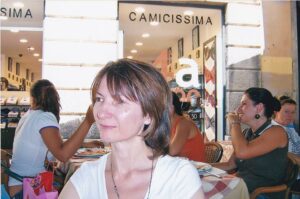
We are all driven to keep going, to please others, and as someone who has M.E. I have come to value the importance of deep rest and saying no. We don’t have to do it all. There is a certain kind of toxicity in always working and doing something, it’s highly addictive. I love watching the seasons change and how nature teaches us about balance, the time to work, rest or play. I like to bring ritual into my everyday life, to be attentive to detail, to lay out the cups and saucers for tea and to take time to light a candle, to be gentle with myself. I don’t like the way in which the sick and disabled are treated, often excluded from society in general. Look at what’s happening in relation to Disability Benefits right now. Medical assessments are not being carried out effectively or fairly. The disabled and sick are forced into a life of poverty with many of their options being stifled. I also feel that sensitivity is a quality that is undervalued in our society. Sensitive souls are often catalysts for change because they bring something unique to our way of life. They offer us another way of seeing, doing and believing. We need to foster a more balanced approach to life, where we can come together and support each other, whatever our circumstances.
Raine Geoghegan, BA Hons, MA, Dip RWTA.
In next week’s blog, THE HEALING POWER OF CAKES AND STORIES, Robbie Cheadle describes how her son’s serious illness led to her children’s books combining stories with cake making.
ABOUT LESLIE TATE’S BOOKS:

I interviewed writer Julia Lee Barclay-Morton about her experience of autism. Julia began as an experimental dramatist in New York, moving to the UK to

I interviewed Gillean McDougall from Glasgow, who edited the collaborative projects Honest Error (on Charles Rennie Mackintosh and his wife Margaret Macdonald) and Writing the

I interviewed French writer Delphine de Vigan, whose book, No et moi, won the prestigious Prix des libraires. Other books of hers have won a clutch

I interviewed Joanne Limburg whose poetry collection Feminismo was shortlisted for the Forward Prize for Best First Collection; another collection, Paraphernalia, was a Poetry Book Society Recommendation. Joanne

I interviewed Katherine Magnoli about The Adventures of KatGirl, her book about a wheelchair heroine, and Katherine’s journey from low self-esteem into authorial/radio success and
| Cookie | Duration | Description |
|---|---|---|
| cookielawinfo-checkbox-analytics | 11 months | This cookie is set by GDPR Cookie Consent plugin. The cookie is used to store the user consent for the cookies in the category "Analytics". |
| cookielawinfo-checkbox-functional | 11 months | The cookie is set by GDPR cookie consent to record the user consent for the cookies in the category "Functional". |
| cookielawinfo-checkbox-necessary | 11 months | This cookie is set by GDPR Cookie Consent plugin. The cookies is used to store the user consent for the cookies in the category "Necessary". |
| cookielawinfo-checkbox-others | 11 months | This cookie is set by GDPR Cookie Consent plugin. The cookie is used to store the user consent for the cookies in the category "Other. |
| cookielawinfo-checkbox-performance | 11 months | This cookie is set by GDPR Cookie Consent plugin. The cookie is used to store the user consent for the cookies in the category "Performance". |
| viewed_cookie_policy | 11 months | The cookie is set by the GDPR Cookie Consent plugin and is used to store whether or not user has consented to the use of cookies. It does not store any personal data. |
12 responses
These blogs are always interesting but I found Raine’s answers very moving. The stillness, gentleness and light she talks about are here; I felt them as I read. I know little about Romany life, culture or language and the references are fascinating, but what’s most compelling is the spirit wisdom Raine has learned through the challenges of M.E. and Fibromyalgia. There’s a sense of loss here but also of deep gain and enrichment. I’m sure many will find much here that is helpful for their own lives.
Thank you Sue for your heart felt comments. I am glad that as well as sensing my loss you have also understood the gift of illness. I wish you well.x
I am very moved by this blog, Raine. Like Sue Hampton, I appreciated and felt the stillness and the gentleness in the thoughts and in the prose. One of the illnesses I have is ME and I too used to be a dancer. I am drawn to the similarities between us and also the differences. I am interested in that shift between dance and acting as creative expression, to writing which is more cerebral…and yet it’s not because sometimes every part of me is in the words just in a different way to dancing and creating a story with the body. I’m also fascinated by how illness highlights and deepens creative expression. From a personal point of view I’m interested in how taxing it was for you to complete an MA with your illnesses. I’m due to start my MA in October and I worry about how I will manage.
Thanks for writing this, Raine.
Hi Katie, I emailed a link to your blog on this website to Raine. She was impressed by it and, like your reaction to her piece, found it very helpful.
It takes courage to be vulnerable, to let go of one way of life before you’ve even begun to glimpse a new way of being. Our whole vocabulary around illness is riddled with falsehoods. We read of people fighting, battling or beating an illness. All very action oriented. No place for solitude, no room for surrender to the present moment, or silent strength. Thank you for your honesty.
I hope you continue to find inspiration in your Romany roots. Our ancestors certainly have plenty to teach us. The rhythm of the language sounds intriguing. I wonder if the word ‘kennel’ is derived from ‘ken’.
Thank you, Ros. Yes, the language of illness is so often derived from war. Changing the language can change the thinking.
Thanks so much Ros, you are always so supportive. I am keen to find out about the word ‘kennel’. Will let you know.xx
An absorbing interview which unpacks the importance of self-awareness, creativity and the expressive power of poetry in bringing narrative attention back to the body. There’s a theme of loss, but also a strong sense of connection to life cycles, biological and cultural inheritance, and the endless possibilities of language. I am eager to read more of Raine’s poems, that undoubtedly, resonate long after reading.
Thank you Hannah for your positive and kind comments. The sense of connection was also mentioned by two other women so i guess this really does resonate on a deep level for many of us. I hope you will get the opportunity to read more of my poems but also I want to read more of yours as I know that you also explore loss in your work.xx
This is a wonderful post of courage and overcoming chronic illness. It has given me some insight into the feelings of a sufferer [as I am the Mother and can see the effects for a sufferer but can’t feel the pain and state of mind]. Raine’s poetry sounds delightful and deep in meaning. It is true that in our fast paced world, we don’t have time to relax and enjoy anything in our world.
Thanks Robbie for commenting. Being the Mother and having to be watchful, mindful is extremely challenging but don’t forget that just by being there you are doing so much. I am so pleased that you like my poetry. I have a way to go but I am happy to be in this place right now. Best wishes.
Thank you, Raine. Your poetry is lovely!